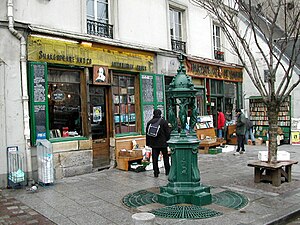Shakespeare and Company (bookshop)

"Shakespeare and Company" store, Paris, 2004
|
|
| Location | Paris, France |
|---|---|
| Owner | Sylvia Beach Whitman |
| Type | Bookstore |
| Opened | 19 November 1919 1922 1951 |
| Website | |
| shakespeareandcompany |
|
Shakespeare and Company is the name of two independent English-language bookstores that have existed on Paris's Left Bank.
The first was opened by Sylvia Beach, an American, on 19 November 1919, at 8 rue Dupuytren, before moving to larger premises at 12 rue de l'Odéon in the 6th arrondissement in 1922. During the 1920s, Beach's shop was a gathering place for many then-aspiring writers such as Ezra Pound, Ernest Hemingway, Djuna Barnes, James Joyce and Ford Madox Ford. It closed in 1941 during the German occupation of Paris and never re-opened.
The second bookstore is situated at 37 rue de la Bûcherie, in the 5th arrondissement, and is still in operation today. Opened in 1951 by American George Whitman, it was originally called "Le Mistral," but was renamed to "Shakespeare and Company" in 1964 in tribute to Sylvia Beach's store and on the 400th anniversary of William Shakespeare's birth. Today, it continues to serve as a purveyor of new and second-hand books, as an antiquarian bookseller, and as a free reading library open to the public. Additionally, the shop houses aspiring writers and artists in exchange for their helping out around the bookstore. Since the shop opened in 1951, more than 30,000 people have slept in the beds found tucked between bookshelves. The shop's motto, "Be Not Inhospitable to Strangers Lest They Be Angels in Disguise," is written above the entrance to the reading library.
Sylvia Beach, an American expatriate from New Jersey, established Shakespeare and Company in 1919 at 8 rue Dupuytren. The store functioned as a lending library as well as a bookstore. In 1921, Beach moved it to a larger location at 12 rue de l'Odéon, where it remained until 1941. During this period, the store was the center of Anglo-American literary culture and modernism in Paris. Writers and artists of the Lost Generation, such as Ernest Hemingway and F. Scott Fitzgerald, as well as Ezra Pound, Gertrude Stein, George Antheil, Djuna Barnes, Mina Loy, and Man Ray, among others, spent a great deal of time there. The shop was nicknamed "Stratford-on-Odéon" by James Joyce, who used it as his office. Its books were considered high quality and reflected Beach's own taste. The store and its literary denizens are mentioned in Hemingway's A Moveable Feast. Patrons could buy or borrow books like D. H. Lawrence's controversial Lady Chatterley's Lover, which had been banned in Britain and the United States.
...
Wikipedia
